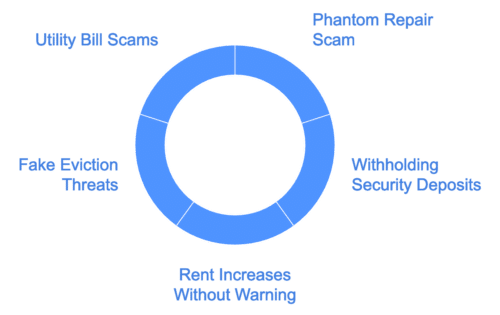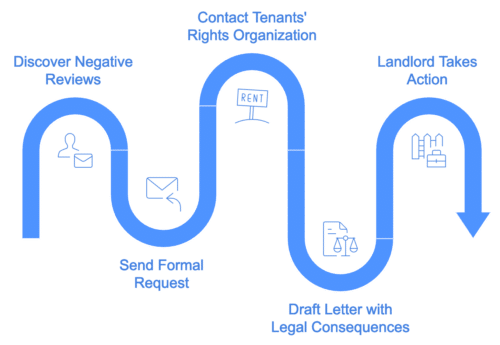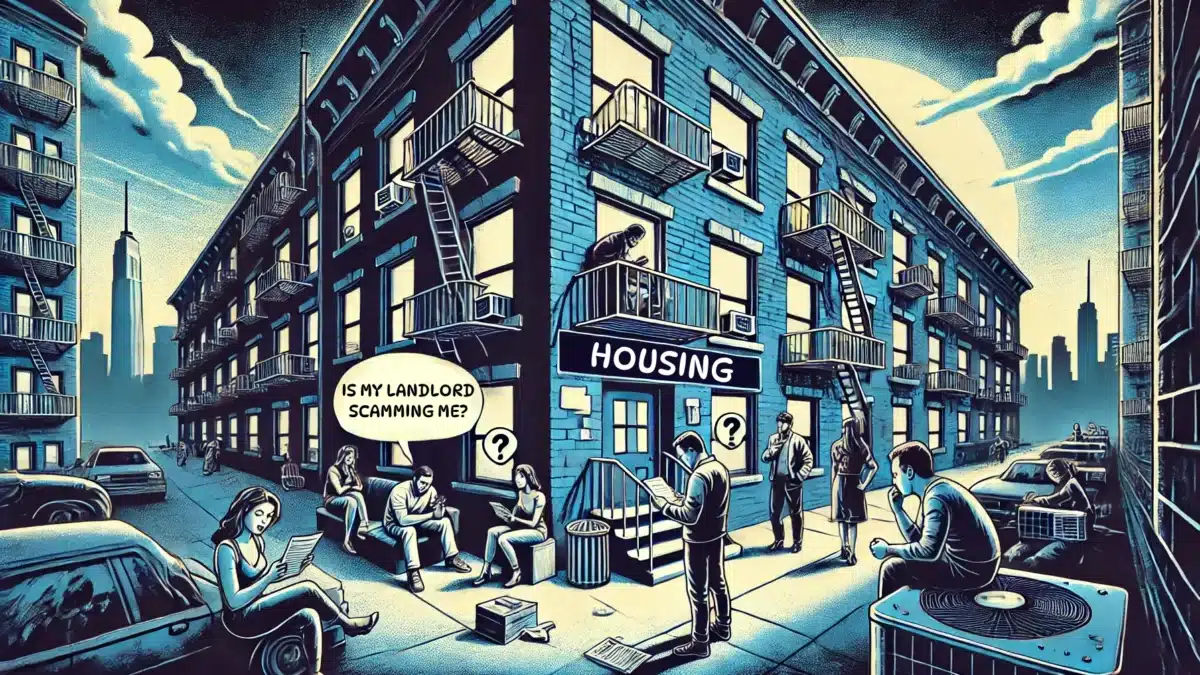
Avoiding Application Fee Scams
March 8, 2022
How to Avoid Rental Scams When Relocating
July 10, 2022When I first found my apartment, everything seemed perfect. The rent was affordable, the neighborhood was nice, and the landlord seemed friendly enough. But after living there for a few months, I started to wonder if I was being scammed. As the problems piled up, I couldn’t shake the feeling that something wasn’t right. Here’s my story of what happened and how I figured out that my landlord might be taking advantage of me.
Red Flags That Made Me Suspicious
At first, everything seemed normal, but there were small things that started to make me uncomfortable. One of the first signs was constant demands for extra money. My lease clearly stated how much I needed to pay each month, but suddenly, my landlord was asking for “maintenance fees” or “extra utilities” that weren’t mentioned in the lease. These extra payments felt unfair, and I started to get suspicious.
Another red flag was repairs that never got done. Every time something in the apartment broke—like the plumbing or the heating—I would call my landlord to get it fixed. He would promise to take care of it right away, but nothing ever happened. I started to wonder if he was just ignoring me on purpose. It got to the point where I was living with a broken heater during the winter, and I realized something was seriously wrong.
Common Landlord Scams in the U.S.
As I did more research, I realized my situation wasn’t unique. Unfortunately, there are many common scams that landlords use to exploit tenants. Here are a few examples that people across the U.S. have experienced, some of which matched my own experience:

- The Phantom Repair Scam
Just like in my case, many landlords promise to fix things but never follow through. They might even charge you for these so-called repairs without actually doing anything. This leaves tenants in a difficult spot—paying for services they never receive while living in unsafe or uncomfortable conditions. - Withholding Security Deposits
I hadn’t reached the end of my lease yet, but I’d heard horror stories from friends. Many landlords refuse to return security deposits, claiming fake damages or other expenses to justify keeping the money. In some cases, landlords might even withhold deposits from tenants who left the apartment in perfect condition. - Rent Increases Without Warning
In certain states, landlords are required to give tenants a set amount of notice before increasing rent. But some shady landlords will raise rent without following these laws, forcing tenants to pay more without warning. This is especially common in hot rental markets where tenants feel pressured to stay despite unfair treatment. - Fake Eviction Threats
Some landlords scare tenants by threatening to evict them over minor issues or disputes. These threats often come without legal basis, and landlords use them to manipulate tenants into paying more money or following unreasonable demands. Many tenants don’t know their rights and end up falling for this scam. - Utility Bill Scams
One particularly sneaky scam involves landlords charging tenants extra for utilities, even if they’re already included in the rent. They might create fake bills or simply tell tenants they owe more money than they do. In my case, this happened when my landlord tried to charge me for “shared utilities” that weren’t mentioned in the lease.
My Breaking Point: The Fake Repairs
The final straw for me was the fake repairs. After months of asking for basic things to be fixed and getting nothing in return, I had enough. I decided to look up my landlord online to see if other people had complained about him. That’s when I stumbled across Section 8 Shield, a website that helps people check if their housing situation is legitimate or if they’re being scammed.
I wasn’t surprised to find multiple reviews and warnings about my landlord. Other tenants had experienced the same issues—false charges, ignored repairs, and threats of eviction. I realized I wasn’t alone, and it gave me the confidence to take action.
How to Protect Yourself
If you’re wondering whether your landlord is scamming you, there are steps you can take to protect yourself and avoid falling victim to common scams.
- Know Your Lease Inside and Out
Your lease is your first line of defense. Make sure you understand every detail, especially the sections about rent, fees, and repairs. If your landlord is asking for money that isn’t mentioned in the lease, it’s a red flag. Don’t be afraid to question any extra charges or ask for receipts. - Document Everything
One thing I wish I had done earlier was to document every interaction with my landlord. Keep copies of every email, text message, and letter. If you’re having issues with repairs, take photos of the problem and make note of when you contacted the landlord. This documentation will be crucial if you need to take legal action later on. - Understand Your Rights as a Tenant
Each state has different laws protecting tenants, so it’s important to know your rights. For example, in many states, landlords are required to provide a habitable living environment. If your landlord is ignoring repairs that make your home unsafe, you might be able to withhold rent or take them to court. Websites like Section 8 Shield have great resources that explain tenant rights by state, so you can understand what’s legal and what isn’t. - Check for Reviews and Complaints
Before signing a lease—or if you’re already feeling uneasy—do some research on your landlord. Websites like Section 8 Shield allow you to check if your landlord has a history of scamming tenants. You can also search for complaints on websites like the Better Business Bureau or read reviews on rental platforms. - Don’t Be Afraid to Seek Legal Help
If your landlord is clearly violating the lease or breaking the law, don’t hesitate to get legal help. Many states offer free or low-cost legal aid for tenants. You might also be able to find housing advocacy groups that can offer support and advice.
What I Did Next
After discovering all the negative reviews and warnings about my landlord, I decided to take action. I started by sending a formal written request for repairs, citing the sections of the lease where it stated that the landlord was responsible. I also let him know that I was aware of my rights as a tenant, which I had learned about through Section 8 Shield and other resources.
At the same time, I contacted a local tenants’ rights organization for advice. They helped me draft a letter outlining the legal consequences if the repairs weren’t made. Once I sent that, the landlord finally started taking me seriously. Within a week, the repairs were underway, and the extra charges stopped.
Don’t Ignore the Signs

Looking back, I wish I had taken action sooner. The warning signs were there, but I didn’t know enough about tenant rights or landlord scams to recognize them right away. If you’re dealing with similar issues, don’t wait. The longer you put up with a bad landlord, the more likely you are to be scammed out of money, time, or even your home.
If you’re unsure about your situation, always trust your instincts. It’s better to ask questions and do your research than to let things slide. There are many resources available, including Section 8 Shield, where you can find helpful information about housing scams and how to protect yourself.
Conclusion: Take Control of Your Housing Situation
Dealing with a dishonest landlord can be overwhelming, but you don’t have to go through it alone. There are many tools and resources available to help you understand your rights and take action when things go wrong.
If you’re feeling like your landlord is scamming you, start by gathering information and doing your research. Websites like Section 8 Shield can help you verify if other tenants have had similar issues. Most importantly, don’t be afraid to stand up for yourself and demand the treatment you deserve.
By knowing your rights, documenting everything, and using trusted resources, you can protect yourself from landlord scams and ensure a safe, comfortable living situation. Don’t let a bad landlord take advantage of you—take control of your housing situation today.




